"System.UnauthorizedAccessException" - I've seen this message on my screen for 2 days and just couldn't figured out why. I've checked all the possible reasons in my knowledge to make it work but fail. Here is the summary of what I have checked:
- The file in the shared drive (mapped drive in the local network) is not ready only and the full access permissions are granted to everyone. The folders in the file path are also been set to grant full access permissions to everyone.
- I can delete the file manually
- the file was created by the same user (me) and I need to delete it when there is a revision. (delete the old one and put the new one in)
- when I change the destination folder to local drive (c:..), everything works well. No problems to delete files. But it won't work (System.UnauthorizedAccessException) when I change it to the shared drive (H: drive).
- Here are the codes related to the exception:
fdname = inipath + Convert.ToString(ynum);
if (! Directory.Exists(fdname))
System.IO.Directory.CreateDirectory(fdname);
fdname = inipath + Convert.ToString(ynum) + "\\" + Convert.ToString(fpathnum);
if (!Directory.Exists(fdname))
System.IO.Directory.CreateDirectory(fdname);
fdname = inipath + Convert.ToString(ynum) + "\\" + Convert.ToString(fpathnum) + "\\" + Convert.ToString(salodrnum);
if (!Directory.Exists(fdname))
{
System.IO.Directory.CreateDirectory(fdname);
File.SetAttributes(fdname, FileAttributes.Normal);
// File.SetAttributes(fdname, File.GetAttributes(fdname) & ~FileAttributes.ReadOnly); //remove read ony
}
if (File.Exists(fdname + @"\PS" + salodrnum + ".pdf"))
{
File.SetAttributes(fdname + @"\PS" + salodrnum + ".pdf", FileAttributes.Normal);
File.Delete(fdname + @"\PS" + salodrnum + ".pdf");
}
doc.ExportToDisk(CrystalDecisions.Shared.ExportFormatType.PortableDocFormat, fdname + @"\PS" + salodrnum + ".pdf");
File.SetAttributes(fdname + @"\PS" + salodrnum + ".pdf", FileAttributes.Normal);
procForm.Close();


It is a permission issue but I just couldn't figure out where the problem is. Here is the debugging details:
System.UnauthorizedAccessException
HResult=0x80070005
Message=Access to the path 'H:\OrderFiles\21\21003\2100337\PS2100337.pdf' is denied.
Source=mscorlib
StackTrace:
at System.IO.__Error.WinIOError(Int32 errorCode, String maybeFullPath)
at System.IO.File.InternalDelete(String path, Boolean checkHost)
at System.IO.File.Delete(String path)
at OpenOrder.PSForm.crystalReportViewer1_Load(Object sender, EventArgs e) in C:\SG100sys\Source Codes\OpenOrder\OpenOrder\PSForm.cs:line 188
This exception was originally thrown at this call stack: [External Code] OpenOrder.PSForm.crystalReportViewer1_Load(object, System.EventArgs) in PSForm.cs